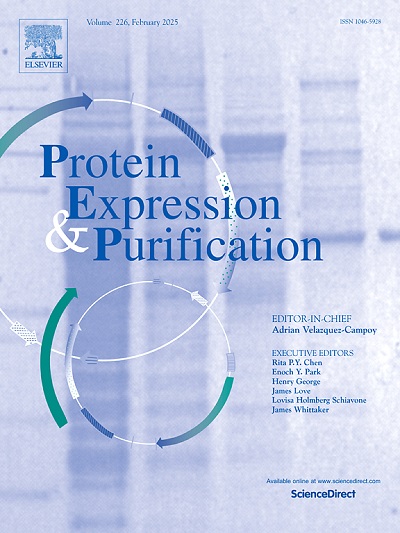Expression, characterization and anti-colon cancer activity of recombinant ginseng peptides with amino acid tandem repeats
IF 1.2
4区 生物学
Q4 BIOCHEMICAL RESEARCH METHODS
引用次数: 0
Abstract
Ginseng peptides, small molecule active ingredients in ginseng, are mainly extracted naturally or synthesized chemically, but high costs and difficulties hinder further research. In this study, a ginseng hexapeptide FKEHGY, named antitumor peptide 0601 (AT0601) and its five tandem sequence repeats AT0605, were expressed in Bacillus subtilis WB600 for the first time, and the bioactivity study showed that the anticancer activity of AT0605 was even significantly higher than that of AT0601 for colon cancer CT26 cells, with IC50s of 16.82 ± 1.3 μM (48 h) and 855.57 ± 6.04 μM (48 h), respectively, i.e. AT0605 achieves the same inhibition rate for CT26 cells at a concentration 50 times lower than that of AT0601. Similar to the ginseng peptide AT0601, recombinant AT0605 also inhibited cell growth by blocking cells in the G1 phase and activated the mitochondria-associated caspase pathway to induce apoptosis. In conclusion, all two kinds of the recombinant ginseng peptides could also inhibit cell proliferation through mechanisms such as inhibiting cell cycle arrest and inducing a decrease in mitochondrial membrane potential.
氨基酸串联重复序列重组人参肽的表达、表征及抗结肠癌活性研究。
人参肽是人参中的小分子活性成分,目前主要是天然提取或化学合成,但成本高、难度大,阻碍了人参肽的进一步研究。本研究首次在枯草芽孢杆菌WB600中表达了人参六肽FKEHGY,命名为抗肿瘤肽0601 (AT0601)及其5个串联序列重复序列AT0605,生物活性研究表明,AT0605对结肠癌CT26细胞的抗癌活性甚至显著高于AT0601, ic50分别为16.82±1.3 μM (48 h)和855.57±6.04 μM (48 h)。即AT0605在比AT0601低50倍的浓度下对CT26细胞具有相同的抑制率。与人参肽AT0601相似,重组AT0605也通过阻断G1期细胞,激活线粒体相关的caspase通路诱导细胞凋亡,从而抑制细胞生长。综上所述,两种重组人参肽均可通过抑制细胞周期阻滞和诱导线粒体膜电位降低等机制抑制细胞增殖。
本文章由计算机程序翻译,如有差异,请以英文原文为准。
求助全文
约1分钟内获得全文
求助全文
来源期刊

Protein expression and purification
生物-生化研究方法
CiteScore
3.70
自引率
6.20%
发文量
120
审稿时长
32 days
期刊介绍:
Protein Expression and Purification is an international journal providing a forum for the dissemination of new information on protein expression, extraction, purification, characterization, and/or applications using conventional biochemical and/or modern molecular biological approaches and methods, which are of broad interest to the field. The journal does not typically publish repetitive examples of protein expression and purification involving standard, well-established, methods. However, exceptions might include studies on important and/or difficult to express and/or purify proteins and/or studies that include extensive protein characterization, which provide new, previously unpublished information.
 求助内容:
求助内容: 应助结果提醒方式:
应助结果提醒方式:


